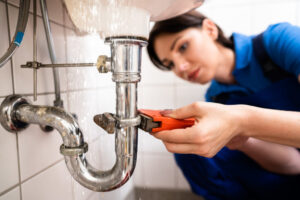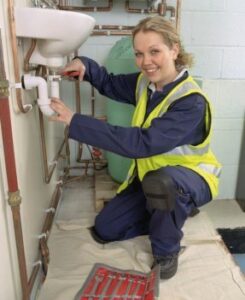Water supply systems are the infrastructures that collect, treat, store and distribute potable water for homes, businesses, public needs, and irrigation. They include piping, pumping stations, and reservoirs. They may use surface or groundwater sources and can be designed to operate by gravity or pressure, depending on the nature of the source and its availability. In most cases, the water is treated to meet quality and quantity requirements before it enters the distribution system. Contact Plumber Roswell today!
The distribution system consists of pipes that convey water from the treatment plant to end users. Its quality is influenced by the design of water pipelines, the distribution network, and the quality control measures in place. The latter ensures that contaminants do not contaminate the water supply. The quality of water in the distribution system is also affected by cross-connections, which can occur when there is a direct or indirect physical connection between a safe water supply and another system that has unsafe water. It can also happen when the distribution system is connected to a system that supplies wastewater.

Leaks in the water supply lines can reduce freshwater flow, and they must be fixed immediately to prevent damage to plumbing fixtures. They can be caused by many things, including loose joints, corrosion, or even stray underground electrical currents. Another common problem is electrolysis, a process by which dissolved chemicals destroy bare copper water lines.
Each house has a water supply line that connects to the public main and then branches into cold and hot water paths that go to all plumbing fixtures in the home. The hot water line leads to the water heater and the faucets, showers, and appliances that require hot water.
A water supply line is essential for every commercial or residential property. Therefore, homeowners and property owners need basic knowledge of its workings. This will help them detect problems and deal with emergencies efficiently. The most important aspect of the water supply line is its meter, which must be read regularly to monitor water consumption.
Drainage is the system of pipes and ducts that carry waste water away from sinks, tubs, showers, toilets, washing machines, dishwashers, and other household appliances. It is also responsible for whisking stormwater away from buildings, rooftops, and other outdoor areas to prevent flooding, mildew, mold, and structural damage. This system usually takes the form of underground piping, although some drains may be aboveground. It may be made from HDPE, PVC, ABS, uPVC, cast iron, galvanized steel, copper, brass, or stainless steel.
Unlike plumbing supply systems, the drainage system does not operate using pressure. The piping within your home drains down into the sewer system through gravity. All the waste matter in your household—including food scraps, cleaning products, and sewage—is carried down these drain pipes to the sewer. This pipe then joins a municipal sewer network that transports it to a sewage treatment plant or septic tank.
The drainage system is crucial to your health and safety because it removes all the toxic substances from your household, preventing them from entering the environment. However, it can suffer from clogs and blockages just like any other plumbing component. When this happens, contacting a professional plumber for plumbing services is important.
You can avoid many problems by keeping up with the maintenance of your drainage system. This includes regularly checking the sewage line to ensure it is free of obstructions. It is also important to watch for any unusual smells from your drains or water pooling around your house. Call a plumber immediately to avoid further damage and expensive repairs if you notice any of these issues.
Some of the most common drainage problems include a clogged or slow-moving drain, which can be easily fixed with the help of a plumber. Another major issue is a leaky, dripping, or burst pipe. This can lead to serious water damage if not repaired quickly. It is important to have regular property inspections and maintenance from a professional plumber to identify potential drainage issues before they become major problems.
Waste disposal involves collecting, transporting, and depositing unwanted materials called waste. This includes sewage, solid waste, and hazardous waste. Various methods are used for waste disposal, but proper waste segregation is always preferred. This ensures less waste accumulation and a cleaner environment. Improper waste disposal can cause various problems, including water, soil, and air pollution. Burning all kinds of wastes without segregating them may also release harmful environmental gases.
Liquid waste disposal sites should be kept away from any water source, especially groundwater or surface water. This is because leaks from the disposal site can contaminate groundwater and threaten people’s health and well-being. If the disposal site is located close to a well water source, it’s important to notify residents of the danger and find a new location for the site.
Garbage accumulation is a serious concern nowadays because of globalization and industrialization. To avoid this, a better waste disposal method is required. One such method is sanitary landfills. This process separates non-reusable and non-recyclable wastes and spreads as a thin layer in low-lying areas around a city. After each layer of waste, a layer of soil is added. The area is then capped with clay to prevent rainwater from entering. Once full, the land is declared unfit for the construction of buildings and can be used as parks or playgrounds.
Another popular method for disposing of liquid waste is leachate collection. The leachate is disposed of in an engineered landfill, a closed system designed to retain and contain the waste. The system consists of soil, clay, and plastic layers that act as barriers to rainwater. It also has vent pipes that allow the gases produced by waste decomposition — namely methane and carbon dioxide — to escape into the atmosphere.
Plumbing is a vast and complicated system that serves multiple purposes in residential and commercial spaces. It involves installing, maintaining, and repairing pipes that carry water, waste, and sewage from fixtures like sinks, bathtubs, toilets, showers, and more. A plumber must be skilled at installing and connecting these systems to ensure safe and efficient operation.
Plumbing work can be as simple as repairing a leaking faucet or as complex as setting up a new home. Regardless of the size or scope of the job, it’s important to hire a professional to avoid costly mistakes that can damage your property and put your health at risk.
A plumber must know local plumbing codes and regulations to ensure all installations comply with safety standards. In addition, they must be able to identify potential problems with existing plumbing and make repairs accordingly. A good plumber is also proactive about maintaining their skills, attending seminars and training to keep up with industry trends and best practices.
The first step in plumbing work is laying out the pipes, which may require cutting and joining them together. Plumbers must use various tools and equipment, including pipe cutters, wrenches, and power saws. After piping is complete, plumbers must test the system to ensure it works correctly and meets all safety standards.
Once the plumbing system is in place, it is time to install the fixtures. These include toilets, water closets (bidets), urinals, faucets, showers, dishwashers, and more. While some fixtures are permanent, others can be removed or replaced. Installing these fixtures requires careful attention to detail and knowledge of water pressure and flow to avoid damaging the pipes or fixtures.
Plumbing services are a critical part of any home renovation project. From designing the pipe network to installing new fixtures and appliances, a professional plumber can make the process smooth and stress-free. They can also help homeowners navigate complex building codes and regulations. This is especially important for older homes with outdated or non-compliant plumbing.
A quality plumbing service will be available around the clock and can respond to calls quickly. They will also be able to handle emergencies, such as clogged toilets and sewer line backups. A plumber with experience can diagnose the problem and recommend the best solution.
A skilled plumber can work with various materials, including copper, PVC, PEX, and galvanized steel. They will also be able to work in tight spaces and small corners. They should be able to understand complex technical drawings and follow instructions. They should also have excellent customer service skills and be able to communicate clearly.


